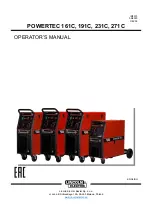
FABRICATOR 211i
INSTALLATION/SETUP
INSTALLATION/SETUP
3-8
Manual 0-5157
3.07 Leak Testing The System
Leak test the system before putting into operation.
1. Be sure that there is a valve in the downstream equipment to turn off the gas flow.
2. With the cylinder valve open, adjust the regulator to deliver the maximum required delivery pressure.
3. Close the cylinder valve.
4. Turn the adjusting screw/knob counterclockwise one turn.
a) If the high-pressure gauge reading drops, there is a leak in the cylinder valve, inlet fitting, or high-pressure
gauge.
b) If the low-pressure gauge drops, there is a leak in the down stream equipment, hose, hose fitting, outlet
fitting or low-pressure gauge. Check for leaks using an approved leak detector solution.
c) If the high-pressure gauge drops and the low-pressure gauge increases at the same time, there is a leak
in the regulator seat.
d) If the regulator requires service or repair, take it to a qualified repair technician.
5. Once leak testing has been performed and there are no leaks in the system, slowly open the cylinder valve and
proceed.
!
WARNING
If a leak has been detected anywhere in the system, dis continue use and have the system repaired. DO
NOT use leaking equipment. Do not attempt to repair a leaking system while the system is under pressure.
3.08 When You Finish Using The Regulator
1. Close the cylinder valve.
2. Open the valve on the downstream equipment. This drains all pressure from the system.
3. Close the valve on the downstream equipment.
4. Turn the adjusting screw counterclockwise to release the ten sion on the adjusting spring.
5. Check the gauges after a few minutes for verification that the cylinder valve is closed completely.
3.09 Storage Of The Regulator
When the regulator is not in use and has been removed from the cylinder, it should be stored in an area where it will
be pro tected from dust, oil, and grease. The inlet and outlet should be capped to protect against internal contamination
and prevent insects from nesting.
















































